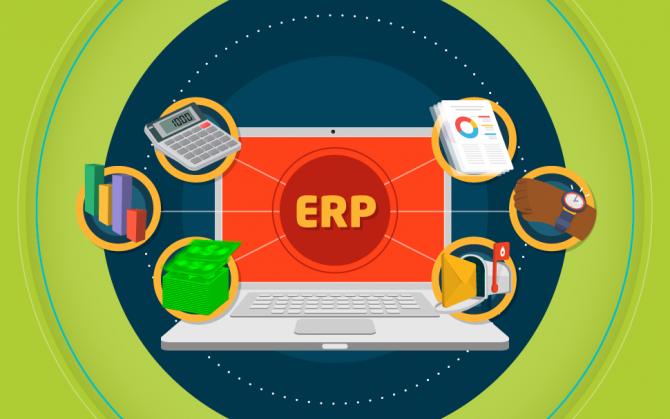
What an ERP system is and why your company needs one
Learn more about the management model that ensures process agility, in addition to being a consolidated and secure database.

What will we see in this post
One of the major challenges for entrepreneurs is achieving great results with low overhead.
Among the management methodologies applied to ensure more efficient processes, the Enterprise Resource Planning, known as an ERP system, is one you definitely need to know if you own a business.
The ERP system is an integrated management model involving various areas of the company at once, ensuring process agility in addition to a concise, secure database.
In this post, we’ll talk a bit more about the ERP system, how it works, what the advantages of this methodology are and what is the right time to implement it in your own business.
Learning more about the ERP system
ERP is an acronym for Enterprise Resource Planning.
In practice, the ERP is software or a program capable of integrating several aspects of a company, in a concatenated and efficient manner.
Financial data, accounting, taxes, human resources, logistics, inventory, sales, and purchasing, in addition to many others, are managed in a unified manner.
This integration of processes is responsible for increasing the level of assertiveness of the company’s responses as well as it reduces response time and generates efficiency.
The concept was developed by Gartner in 1990, initially to refer to a material planning program.
This program was perfected to contemplate other areas, until the present day, where it is responsible for all company processes.
Generally, the ERP system is developed based on modules, each one designed for a specific area of the company, which can be implemented in blocks, at once or in a gradual manner.
The operation of the ERP system
The operation of the ERP system is not as complicated as it seems.
Think of it as a large system capable of processing several aspects of the company at once and in a centralized manner.
Instead of splitting the data management, this program does the exact opposite, it integrates the processes.
This means that from billing to inventory control, everything goes through the integrated management system.
Operational tasks, which, if carried out by employees would take hours, days or weeks, can be done in a matter of seconds by the program.
But in order for all of this to be possible, the ERP system is divided into three large essential layers.
The first one is its functionalities, with the fields to be filled out, with the respective spaces, as if it was a form.
The second layer is internal and concerns the collection and storage of information.
The third layer is the customization to allow new functionalities to be added to the ERP system.
ERP system advantages
There are several advantages to applying the ERP system in a business. Here, we’ll talk about the main ones that can be obtained immediately.
Firstly is process optimization.
Automation is already a reality, helping thousands of businesses to produce more while spending less. Using a business management system enables entrepreneurs to achieve better results with decreasing overheads.
Another highlight is the quality of the information that exists within the company.
The volume of data produced and transferred is large, requiring a great deal of personal effort in filtering all the data and collecting only what matters.
When data analysis is performed manually only, mistakes are bound to happen.
Therefore, so that all sectors can access quality information with speed and security, the ERP system is recommended.
For entrepreneurs, reducing risks is a constant goal.
The implementation of the ERP system enables the company to have more security when it comes to the routine activities, which is key due to the need of having assertive internal information.
The ERP system can make a difference in the entrepreneur’s financial results, generating more profit. After all, a company with integrated processes, with fewer errors and more assertiveness is able to implement better decision-making processes, which are essential for its growth.
In addition, businesses that use this methodology are able to perceive their scalability better, which corresponds to a company’s chances of growth and expansion.
ERP system modules
It is common for business management systems to be grouped into two modules:
- Departmental view
- View by segment.
In the first one (departmental), are the various company departments.
This ERP system division makes it easier for operators when handling the system.
People responsible for each sector are able to manage aspects of that sector, without interfering in matters that require specific area-related knowledge.
In the second module (by segment), more specific aspects of the company are analyzed.
Even within departments, there may be processes that require special attention.
For these special processes, modules are created separately, so that these they can be handled by qualified professionals.
There is no need for all areas of a company to be contemplated at once. The entrepreneur will assess the possibility of implementing the system in blocks, which could represent considerable savings for the business.
How do I know if my company needs an ERP system?
Although it provides several benefits, this business management system is more efficient when implemented at the right time, when the company has to meet demands that can be fulfilled by the software.
There are a few crucial factors that indicate the need for the implementation of an integrated methodology. Among them is low company productivity, represented by mechanical processes, susceptible to all kinds of errors.
Another factor that indicates the right time to start using the ERP system is a large number of communication errors within the company, which is when the information is generated and produced but not interpreted and analyzed correctly.
Let’s take a detailed look at a few of the indicators that suggest the need for an ERP system:
Non-integrated information
When the company information is not integrated, the analysis of complex results and even of simpler processes becomes an arduous task.
Professionals end up getting lost amid the large volume of data, often useless, a mixture of information from various sectors without any parameters.
A company in this situation would have a lot to gain by using an ERP system, which provides the integration of information from various sectors.
Lack of strategic support
When the company’s sectors and segments don’t share information properly, managers and entrepreneurs have no strategic support.
The decision-making process should take into account the entire business scenario. Therefore, all data must be integrated and available at a single strategic point.
Conclusion
The ERP system has several benefits, which can be clearly seen after it’s implemented.
However, before you start using it, it is essential that you research how this methodology operates.
How can the ERP system contribute to your business? This is one of the questions you must answer before implementing it.
It’s worth remembering that one of the main goals of these systems is to make the work more efficient, generating less overhead.
So, make sure this is the best strategy for your business at the moment.
In addition to the ERP system, there are other strategies that can also help your business; one of them is improving communication.
Have you noticed that you need to communicate better with those who work for you?
So make sure you read our tips to improve your business communication.




